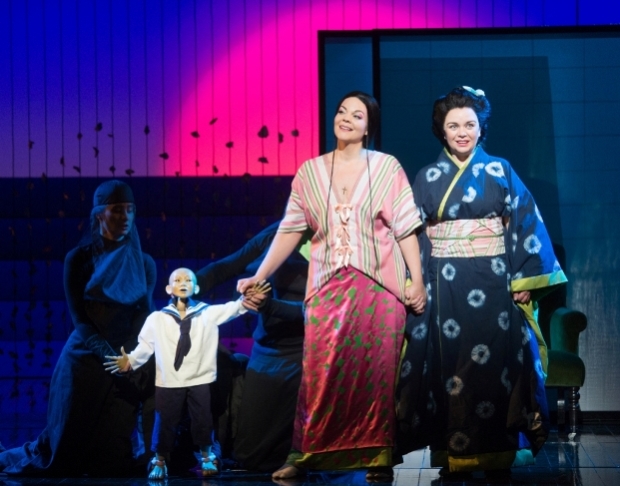Madam Butterfly (London Coliseum)
English National Opera revives Anthony Minghella’s popular production

© Thomas Bowles
No need to rehash the bouquets and brickbats for the late Anthony Minghella‘s exquisite staging of Puccini’s beloved opera (and template for Miss Saigon). We've been there before. The images are cherishable, the concept infuriating. As a paean to the ritualised beauty of Japanese art it’s in a class of its own, but for an opera that bleeds the tears of Italy it simply doesn’t work.
Thousands of happy spectators feel differently.
The tragedy of Cio-Cio-San, a young geisha whose night of pleasure with US Naval Lieutenant Pinkerton means so much more to her than it does to him, is a heartbreaking tale that depends for its impact on the despair caused by irreconcilable racial and cultural differences. As such Madam Butterfly is still as relevant as ever; but Minghella lathers on the visual perfume in order to wash clean its core message. Scenes like the erotic first-act love duet are drowned in a sea of hand-held lanterns and blood-red petals.
The production’s impact in this, its sixth revival (the third undertaken by the meticulous Sarah Tipple) is further compromised by the orchestrally fattened conducting of Sir Richard Armstrong. While the Italianate idiom is clearly more to the distinguished veteran’s taste than Bizet’s Iberian colours (he was not at home in Carmen last year), for some reason he gives the ENO Orchestra free rein to drown the voices pretty much throughout. Singers of proven power find their vocal beauty diminished by uncontrolled swells that oblige them to oversing.
'Synthetic emotions'
Through it all, the always-revelatory David Butt Philip manages to give Pinkerton a more comprehensive and layered interpretation than many of his predecessors in the production. The American soprano Rena Harms, by contrast, battles through the title role with unsubtle vocal forwardness, her delivery of David Parry’s happy translation often completely indecipherable. I spent the entire evening reading the surtitles—a strange thing to be doing in opera that speaks my language.
Neither do I warm to Harms’s coquettishly scrutable face work. She rolls and flutters her eyes, smiles and grimaces to distraction, and is every inch the coy mistress rather than the trusting innocent.
George von Bergen returns as an excellent, suitably bluff Sharpless, his avuncular characterisation a million miles from the Don Giovanni he’s lately been playing for ETO. Alun Rhys-Jenkins grabs every moment he’s onstage as Goro and Stephanie Windsor-Lewis is outstanding as Butterfly’s maid Suzuki, loyal to a fault yet worried sick at every turn. There is notable work, too, from Matthew Durkan as Prince Yamadori and Mark Richardson as a terrifying Bonze.
The wooden toddler is back as Cio-Cio-San’s son, courtesy of the magnificent Blind Summit Theatre; but if you can warm to the fate of a puppet rather than a real boy I can think of another story you might like. Clever though it is, its brilliant artifice arouses entirely synthetic emotions. What would Puccini have said?












